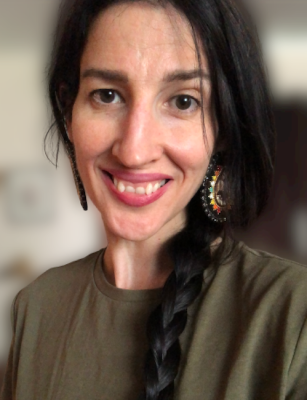School of Education doctoral candidate Ionah M. Elaine Scully, Michel First Nation (Cree-Métis and Irish) has been awarded a prestigious National Academy of Education NAEd/Spencer Dissertation Fellowship for the 2023-2024 academic year. They are one of 35 awardees from a pool of more than 350 applicants.
 Holding a B.A. from Sarah Lawrence College and certificates of advanced study in Conflict Resolution from the Maxwell School of Citizenship and Public Affairs and in Women’s and Gender Studies from the College of Arts and Sciences, Scully’s research involves storytelling, Indigenous methodologies, land pedagogy, and Two Spirit critiques.
Holding a B.A. from Sarah Lawrence College and certificates of advanced study in Conflict Resolution from the Maxwell School of Citizenship and Public Affairs and in Women’s and Gender Studies from the College of Arts and Sciences, Scully’s research involves storytelling, Indigenous methodologies, land pedagogy, and Two Spirit critiques.
Scully adds this fellowship to their New York Public Humanities Grant (2021), University of California Davis’ Publicly Active Graduate Education (PAGE) fellowship (2019), and SU’s LGBT Resource Center Social Justice Award (2016), as well as awards for excellence in teaching, activism, writing, scholarship, and land-based education initiatives. Scully also is a professional dancer and dance instructor who has been one of the most sought-after teachers and performers in Upstate New York.
A member of the University’s Intergroup Dialogue Program (IGD), a theory and practice-based initiative of social justice education, Scully has created an Indigenized IGD course—offered in community, school, and higher-education settings—that employs land, Two Spirit, and other Indigenous pedagogies to create generative dialogue and communities of care and learning across difference.
Scully teaches foundations of education, gender studies, and Native studies, describing their teaching philosophy as publicly engaged, activist, and holistic. In their courses, they encourage multi-sensory learning, the mitigation of classroom hierarchies, and addressing equity issues.
About Ionah Scully’s Doctoral Thesis
Scully’s dissertation—”Nehiyaw Two Spirit Creation Stories: Re-mapping Home, Desire, and Indigenous Education Through the Body”—brings together Two Spirit (Native 2SLGBTQIA+) people of Michel First Nation (MFN) to dialogue about Nehiyaw (Cree) creation stories and subsequently recreate—or re-map—their own creation stories as Two Spirit (2S) people to understand how these stories can support Indigenous and decolonizing educational practices.
2S scholars argue that anti-colonial projects must center 2S futurity because they experience the highest rates of gender violence of any demographic—violence endemic to the ongoing colonial project.
This scholarship is immersed in an Indigenous epistemology of contextuality, temporality, and relational accountability that undergirds the entire project design. Told as teaching stories, creation stories must necessarily change as they pass through different time periods and bodies of human storytellers and audiences (as well as different bodies of lands/waters) to impart teachings that are pertinent to context and attentive to relations.
Across six Talking Circles, participant-collaborators are given critical prompts rooted in miskâsowin. A Nehiyaw practice, miskâsowin invites participant-collaborators to integrate mind and body-knowing as a mechanism for coming home (to bodies, desires, Nehiyaw ontologies, and perhaps homelands) to counteract the colonial project’s attempts to dispossess 2S people of life and home.
A project of homecoming that centers 2S desires, the resulting stories are shared in an anthology for use by educators and MFN as well as 2S communities broadly to consider their responsibility to the stories, what these stories teach, and how they provide prompts to craft their own stories.
Glossary of Italicized Terms
Notes written by Ionah Scully
